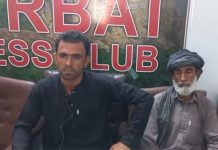A rally organized by the Baloch Yakjehti Committee (BYC) Quetta Zone on Wednesday drew thousands of participants from Balochistan University to the “Shuhda-e-Balochistan” Cemetery in New Kahan, Hazarganji.
Attendees traveled on motorcycles, rickshaws, and cars, chanting slogans against what they described as the “ongoing genocide of the Baloch people.” Organizers said the event aimed to mobilize public support for a national gathering in Dalbandin on 25 January, marking “Baloch Genocide Memorial Day.”
During the rally, BYC leaders and participants paid tribute to “Baloch martyrs and victims of state violence.” Addressing the crowd, BYC leader Bibagar Baloch said that the sacrifices of “Baloch martyrs” had awakened society. He urged a large turnout in Dalbandin to demonstrate unity and resistance against what he referred to as the ongoing “Baloch genocide.”
Meanwhile, in Naseerabad, BYC leader Dr. Mahrang Baloch addressed a public corner meeting as part of the BYC’s preparations for “Baloch Genocide Memorial Day.” She commended the locals for overcoming fear of state oppression, describing the program as “successful.”
Dr. Mahrang emphasized that the Baloch people must recognize their position under the state’s system and laws. She accused authorities of subjugating the Baloch, regardless of where they live or what language they speak, while exploiting the region’s resources. She argued that forms of “genocide” vary across regions but share the goal of disconnecting the Baloch from their national struggle.
She alleged that the Pakistani state prioritizes the seizure of fertile Baloch lands as a first step in its campaign, forcing local farmers into a feudal system controlled by state-backed landlords. She criticized tribal chiefs and nawabs for acting as “facilitators in the Baloch genocide” and said they exploit linguistic diversity to divide the Baloch people.
She urged locals in Naseerabad and Jafarabad to reclaim their national identity, referencing historical figures like Chakar Khan and Balach to highlight the Baloch’s long history predating colonial boundaries.
Dr. Mahrang also accused the Pakistani state of negligence, arguing that floods are not solely natural disasters but a result of policy failures.
She noted that cancer and maternal deaths persist in the region, claiming the state’s silence indicates a systematic attempt to eliminate the Baloch population.
She condemned the resettlement of non-Baloch people, stating that while peaceful coexistence is welcome, those who seek to divide the Baloch are enemies.Despite linguistic diversity, she stressed that the unifying identity is Baloch and called for unity in the movement to fight for their rights.
“This,” she concluded, “is our only opportunity to join the struggle for our rights.”






























